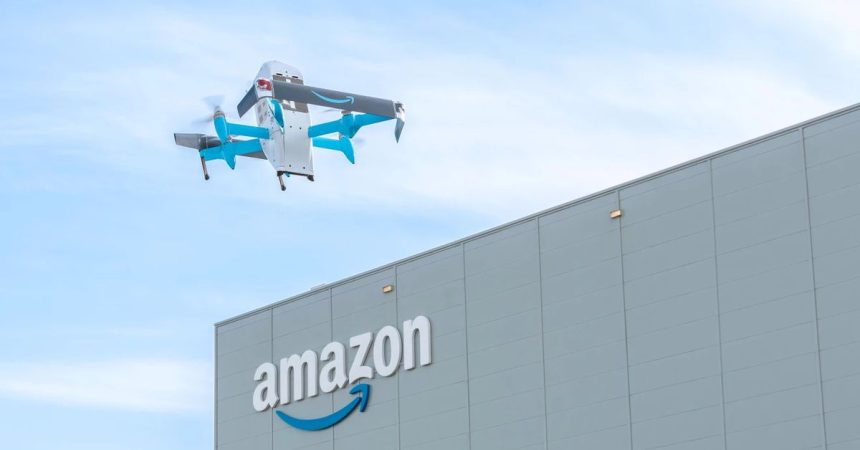Amazon’s inaugural drone delivery trial in Italy marks a pivotal step towards realizing the company’s ambition of establishing a global drone delivery network. The successful test flight, conducted on Wednesday in San Salvo, utilized Amazon’s cutting-edge MK30 drone, a testament to the company’s ongoing investment in drone technology. This drone, capable of transporting packages weighing up to five pounds (2.27 kilograms) even in light rain, has already received Beyond Visual Line of Sight (BVLOS) operational authorization in the United States. This capability is crucial for efficient drone deliveries, allowing drones to operate beyond the direct sight of the operator and navigate more complex delivery routes. The Italian test flight, conducted under the watchful eye and with the explicit authorization of Italian aviation regulatory bodies ENAC and ENAV (equivalent to the US Federal Aviation Administration), signifies Amazon’s commitment to collaborating with local authorities and adhering to established safety and operational protocols. The San Salvo test is a significant milestone in Amazon’s broader European expansion strategy, adding a tangible dimension to the company’s previously announced plans to launch its drone delivery service in Italy and the UK in 2024. This move underscores Amazon’s dedication to innovating its delivery infrastructure and providing customers with faster, more efficient, and environmentally sustainable delivery options.
The choice of Italy as a testing ground highlights the country’s growing receptiveness to drone technology and its potential role in reshaping logistics and delivery services. Italy’s regulatory landscape, while stringent, has demonstrated a willingness to embrace innovative technologies, providing a fertile ground for Amazon’s drone ambitions. The San Salvo trial serves as a practical demonstration of Amazon’s commitment to working within existing regulatory frameworks, proving the safety and viability of drone deliveries in real-world scenarios. This hands-on approach is crucial for gaining public trust and building a strong case for wider adoption of drone technology. By partnering with Italian authorities, Amazon is not only advancing its own business interests but also contributing to the development of a robust and safe drone ecosystem, potentially paving the way for other companies to explore and implement similar delivery solutions. The successful completion of the test flight further solidifies Amazon’s position as a leader in drone delivery innovation, pushing the boundaries of logistics and setting a precedent for future drone operations in Europe.
Amazon’s stated goal of commercially launching its Prime Air delivery service in Italy by 2025, pending regulatory approval, demonstrates the company’s confidence in its drone technology and its long-term vision for the future of delivery. This projected launch date signals a transition from experimental testing to full-scale operational deployment, potentially revolutionizing the way packages are delivered in Italy. The successful integration of drone deliveries into Amazon’s existing logistics network could significantly reduce delivery times, enhance efficiency, and minimize environmental impact, ultimately benefiting both consumers and the company. However, the realization of this vision hinges on securing final regulatory approval, a process that requires continued collaboration with Italian authorities and demonstration of consistent safety and operational excellence. The 2025 target serves as a motivating factor for Amazon to further refine its drone technology, optimize delivery processes, and address any remaining regulatory concerns.
While the Italian test flight represents a major advancement, the path to widespread drone delivery adoption is not without its hurdles. Securing regulatory approval remains a critical challenge, requiring companies like Amazon to navigate complex legal frameworks and demonstrate unwavering commitment to safety and compliance. The rigorous scrutiny from regulatory bodies, though essential for ensuring public safety and responsible drone operation, can often prolong the deployment timeline and require significant investment in compliance measures. Furthermore, public perception of drone technology plays a vital role in its acceptance and integration into daily life. Addressing concerns regarding privacy, noise pollution, and potential safety risks is paramount for building public trust and facilitating wider adoption of drone delivery services. Amazon’s proactive engagement with local communities and its transparent communication regarding drone operations are crucial steps in fostering understanding and acceptance.
The contrasting regulatory landscapes in Italy and the UK further highlight the complexities of drone deployment across different jurisdictions. While Italy has demonstrated a progressive approach to drone testing and potential deployment, the UK’s regulatory framework appears more cautious. Although the UK has selected six drone testing projects, including Amazon’s, the timeline for these tests remains uncertain. This disparity underscores the need for harmonized regulations across different countries and regions to enable seamless cross-border drone operations and facilitate the growth of the global drone delivery market. Amazon’s experience in navigating these diverse regulatory environments will be invaluable in shaping future drone regulations and promoting international collaboration in the development of standardized safety protocols.
Looking ahead, Amazon’s successful drone test in Italy signifies a significant step towards realizing the transformative potential of drone technology in the logistics industry. The company’s commitment to innovation, coupled with its collaborative approach to regulatory compliance, positions it as a frontrunner in the race to establish a robust and efficient drone delivery network. The lessons learned from the Italian trial, combined with ongoing efforts in other regions, will shape the future of drone delivery, paving the way for a new era of faster, more sustainable, and convenient delivery solutions. The continued development and refinement of drone technology, alongside the establishment of clear and consistent regulatory frameworks, will be crucial for unlocking the full potential of drone deliveries and revolutionizing the global logistics landscape.



